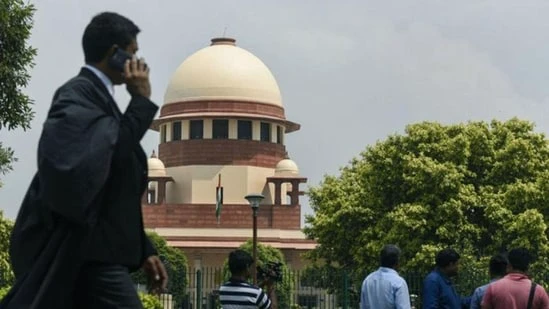The Supreme Court on Wednesday hinted at considering abolishing Talaq-e-Hasan, a form of the triple talaq practice by which a Muslim man can divorce his wife by saying the word ” talaq” once for three consecutive months.
The top court termed the practice as “gross discriminatory”.
The Supreme Court was hearing a Public Interest Litigation (PIL) petition filed by journalist Benazeer Heena in 2022 seeking that the practice is declared unconstitutional as it is irrational, arbitrary and violative of Articles 14, 15, 21 and 25 of the Constitution, according to Bar and Bench.
The PIL also sought guidelines on gender and religion neutral procedure and grounds to dissolve marriages.
The petitioner’s husband had allegedly divorced her by sending a Talaq-e-Hasan notice through a lawyer over dowry. Her in-laws were also allegedly harassing her for the same.
‘Is this what you follow?’
The Bench of Justices Surya Kant, Ujjal Bhuyan and N Kotiswar Singh said that the Supreme Court may have to step in to take remedial measures as the practice affects society at large.
“Society at large is involved. Some remedial measures have to be taken. If there are gross discriminatory practices, then the court has to interfere,” Bar and Bench quoted Justice Kant orally remarking.
Justice Kant also asked how a practice like Talaq-e-Hasan, which is against the dignity of women, can be allowed to stay in a civilised society.
“What kind of thing is this? How are you promoting this in 2025? Whatever best religious practice we follow, is this what you allow? Is this how a dignity of a woman be upheld? Should a civilised society allow this kind of practice?” the judge asked.
The Bench also said the matter could be referred to a five-judge bench and asked the parties before it to submit notes with the broad questions which may arise for consideration.
Justice Kant also observed that while the petitioner, being a journalist, has the ability to go to the Supreme Court, many women from less privileged backgrounds may be suffering in silence.
“Today we have a journalist before us. What about those unheard voices living in remote areas?,” the Bench said.
The advocate of the petitioner’s husband told the Supreme Court on Wednesday that it is a well known practice in Islam to appoint a person to send a Talaq-e-Hasan notice.
Justice Kant asked why the man – who had appointed a lawyer to send the Talaq-e-Hasan – could not communicate directly with the petitioner.
Counsel for Heena submitted that due to the manner in which she got the Talaq-e-Hasan notice, she has been unable to prove that she is divorced even though her husband has married again.
“The problem started with the schools where I wanted to get my child admitted. Everywhere I said I was a divorcee, my papers were not accepted. Admission was rejected. I told the father has moved on, married again. I don’t know the technicalities,” the counsel for the petitioner submitted.
